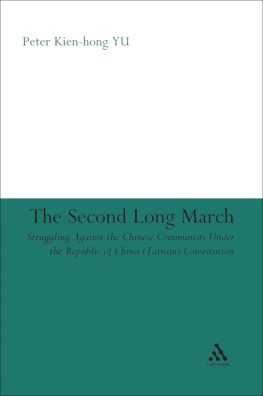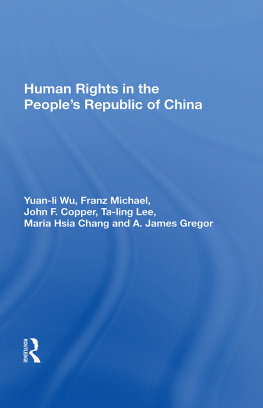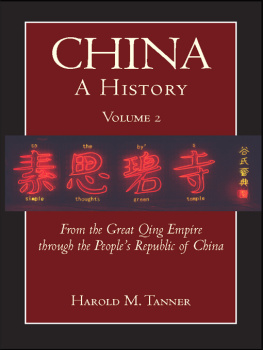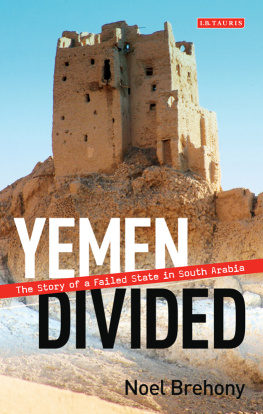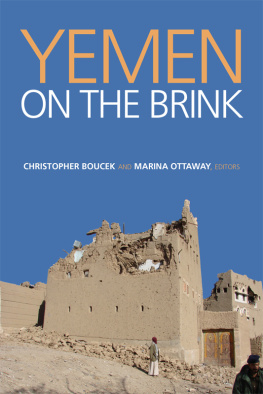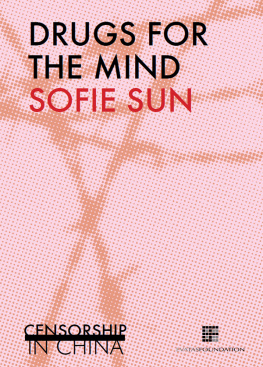ROUTLEDGE LIBRARY EDITIONS: POLITICS OF THE MIDDLE EAST
Volume 7
CHINA AND THE PEOPLES DEMOCRATIC REPUBLIC OF YEMEN
CHINA AND THE PEOPLES DEMOCRATIC REPUBLIC OF YEMEN
A Report
Translated, edited and introduced by
HASHIM S. H. BEHBEHANI
First published in 1985 by KPI Limited
This edition first published in 2016
by Routledge
2 Park Square, Milton Park, Abingdon, Oxon OX14 4RN
and by Routledge
52 Vanderbilt Avenue, New York, NY 10017
Routledge is an imprint of the Taylor & Francis Group, an informa business
1985 Hashim S. H. Behbehani
All rights reserved. No part of this book may be reprinted or reproduced or utilised in any form or by any electronic, mechanical, or other means, now known or hereafter invented, including photocopying and recording, or in any information storage or retrieval system, without permission in writing from the publishers.
Trademark notice: Product or corporate names may be trademarks or registered trademarks, and are used only for identification and explanation without intent to infringe.
British Library Cataloguing in Publication Data
A catalogue record for this book is available from the British Library
ISBN: 978-1-138-83939-7 (Set)
ISBN: 978-1-315-68049-1 (Set) (ebk)
ISBN: 978-1-138-92928-9 (Volume 7) (hbk)
Publishers Note
The publisher has gone to great lengths to ensure the quality of this reprint but points out that some imperfections in the original copies may be apparent.
Disclaimer
The publisher has made every effort to trace copyright holders and would welcome correspondence from those they have been unable to trace.
China and the
Peoples Democratic
Republic of Yemen
A Report
Translated, edited and
introduced by
Hashim S. H. Behbehani
First published in 1985 by KPI Limited
14 Leicester Square, London WC2H 7PH,
England
Distributed by
Routledge & Kegan Paul plc
14 Leicester Square, London WC2H 7PH,
England
Routledge & Kegan Paul Inc
9 Park Street, Boston, Mass. 02108, USA
Routledge & Kegan Paul
464 St Kilda Road, Melbourne,
Victoria 3004, Australia and
Routledge & Kegan Paul plc
Broadway House, Newtown Road,
Henley-on-Thames, Oxon RG9 1EN, England
Produced by Worts-Power Associates
Photoset and printed in 10/13 Times
by Redwood Burn Ltd, Trowbridge, Wiltshire
Hashim S. H. Behbehani 1985
No part of this book may be reproduced in any form without permission from the publisher, except for the quotation of brief passages in criticism
Library of Congress Cataloging in Publication Data
ISBN 0-7103-0097-2
Contents
To my father and brothers
It is worth noting how Chinese sources reported the official PDRY delegations visit in their official coverage. Formal diplomatic relations were established on 31 January 1968 between the Peoples Republic of China and the newly founded state of the Peoples Republic of Southern Yemen (referred to here as the Peoples Democratic Republic of Yemen PDRY) at a ceremony in Cairo attended by Muhammad Hadi Awad, plenipotentiary of the government of the PDRY, and the only high-ranking ambassador from the Peoples Republic of China outside the country, Huang Hua, since all others were recalled during the Cultural Revolution. During the Cultural Revolution, Huang Hua was reputed to be the most senior member of the Chinese diplomatic service. A student activist in the 1930s and subsequently an interpreter for the Chinese Communist Party in charge of the English-speaking section, he had been a close associate of Chou En-Lai since the Geneva Conference of April 1954 and the Bandung Conference in April 1955. In August 1960 he received his first post as the PRCs first ambassador to Ghana, where he made several diplomatic breakthroughs for China among the African nations, especially in what was then called Tanganyika, in December 1961, Congo (Brazzaville), in February 1964, and Dahomey, in November 1964. He was also in charge of signing trade, diplomatic, technical and friendship treaties and agreements. In March 1966, he was appointed as ambassador to the United Arab Republic (Egypt), thus assuming charge of the PRCs most important diplomatic post, both in the Arab world and in Africa. He was the only Chinese ambassador who remained in his post during the upheavals of the Cultural Revolution. He was stationed in Cairo until becoming the first Chinese ambassador to the United Nations in October 1971.
The press communiqu mentioned, inter alia, that:
The Government of the Peoples Republic of China has recognized the Peoples Republic of Southern Yemen and the latters sovereignty over all its territories and islands. The Government of the Peoples Republic of Southern Yemen recognized the Government of the Peoples Republic of China as the sole legal Government representing all the Chinese people. [Italics added]
In the midst of the Cultural Revolution and at a time when China had recalled all its ambassadors, save for the prominent figure of Huang Hua stationed in Cairo, the establishment of formal diplomatic relations was certainly a breakthrough, particularly on the issue of recognizing the PRC as the sole legal government representing all the Chinese people. Moreover, the newly established state of the PDRY came about after less than a year had passed since the Arab-Israeli Six-Day War of June 1967.
Peoples Daily carried an editorial which devoted most attention to the general Arab situation whereby Arab anti-imperialism is considered to be one of the most important factors for uniting the destiny of the Chinese and Arab peoples, with particular attention given to the struggle of the Palestinian people. Moreover, the editorial stressed that the anti-imperialist trend in the Arab world, carried by the Arab people rather than the Arab governments, was directed against U.S. imperialism. Thus, nothing was mentioned about Soviet revisionists imperialists, which seems peculiar since Chinese anti-USSR sentiments were given high priority during the Cultural Revolution.
Eight months after establishing diplomatic relations, on 17 September 1968, an official high-ranking PDRY delegation arrived in Peking. Before dealing with the main text, we will concentrate here on Chinese press commentaries and official statements made during the visit. It is noteworthy in this connection that the late Faysal Abd al-latif noted down what the Chinese had expressed in opinions rather than what the delegation members had to say in analysing various conditions prevailing in the Arabian Peninsula and the Gulf.
Upon the arrival of the delegation, the mood of the receptions was typical of circumstances during the Cultural Revolution. The delegation was headed by the late Foreign Minister, Saif Ahmad al-Dal, and was received in Peking, after a stopover in Shanghai, by:





